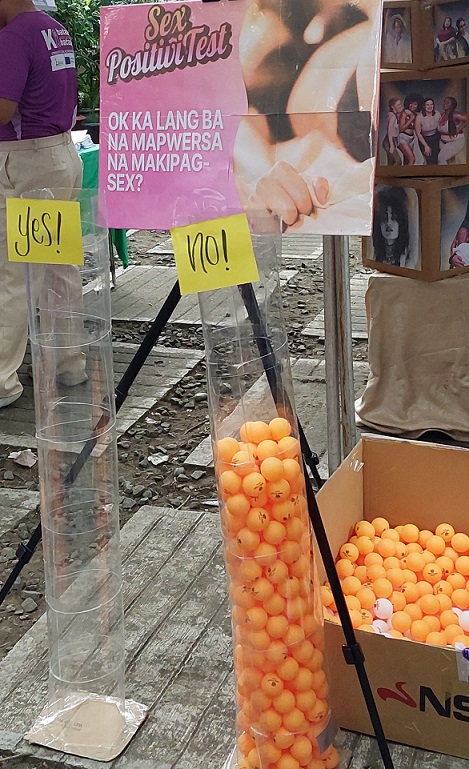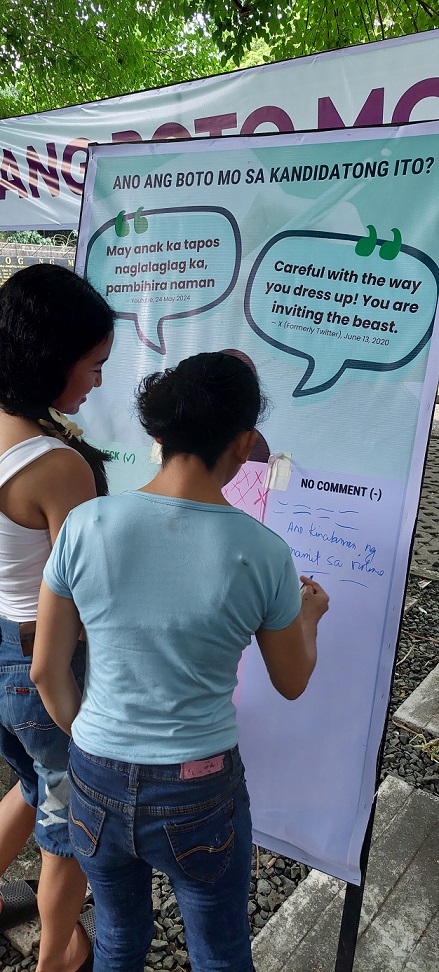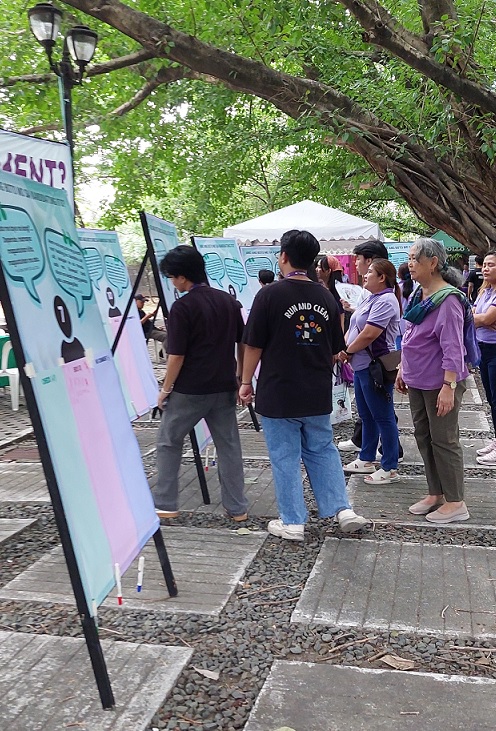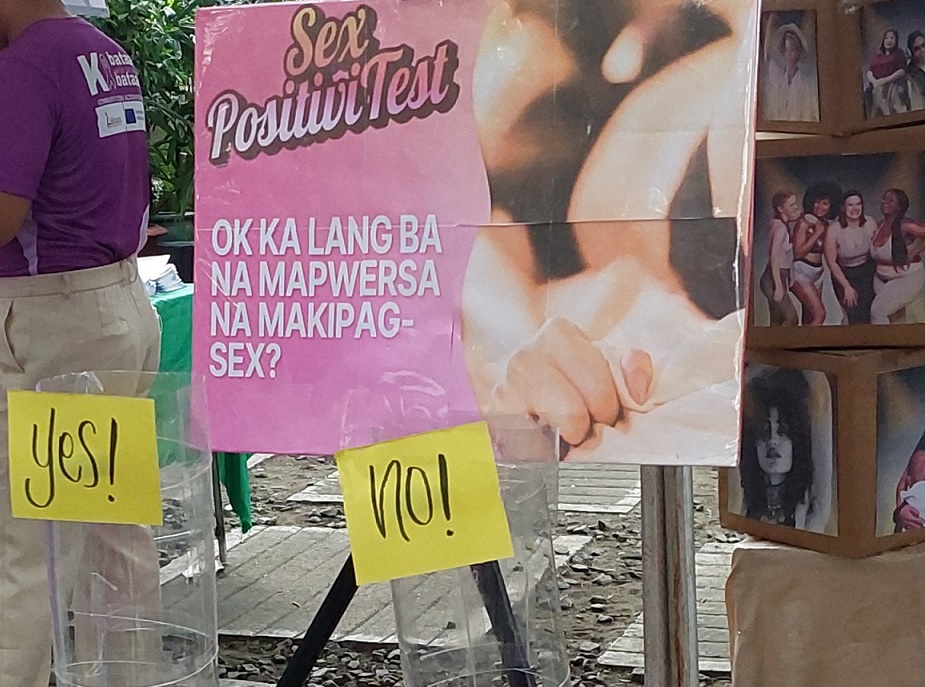Former president Rodrigo Duterte’s arrest and detention for crimes against humanity must include his offenses against Filipino women for shaming and degrading them when he was in power, women activists said Thursday at a gathering that aimed to raise women’s issues high during the elections.
“The machismo that degraded women blatantly became the norm that was very damaging to women’s psyche and social positions,” said Dr. Junice Melgar, executive director of Likhaan Center for Women’s Health.
Melgar said Duterte’s detention and eventual trial is a fresh start for Filipino women to know what they want from their next leaders. “Women’s issues are political issues that is why we want to steer women into thinking and choosing better,” she said.
Likhaan led the “Pasya ng Kababaihan sa Sariling Katawan, Iabante sa Halalan!” (Advance women’s bodily autonomy in the elections) interactive program at the Bantayog ng mga Bayani in Quezon City on March 26 to observe women’s month and to raise women’s issues in the national political agenda in view of the upcoming 2025 midterm elections.

More than 400 women and young people went through their understanding of “bodily autonomy,” which refers to having the freedom to decide and choose for one’s body and sexuality, through art exhibits, photo booths, games and a survey on sexual positivity.
There was also a straw poll on the top 12 Senate choices based only on past statements from 16 candidates who made the top 12 in the February 20-26, 2025 survey by Pulse Asia Research Inc.
On standees that asked, “Ano ang boto mo sa kandidatong ito? (What is your vote for this candidate?),” participants put checks on candidates, all unidentified, with pro-women statements and crossed out those with degrading quotes.
On another board, participants wrote their answers on, “Anong katangian ang gusto mo sa isang kandidato (What qualities do you expect from a candidate?).”
Melgar said Duterte’s influence was so strong that many senatorial candidates especially those on top of surveys were the ones who continued with their anti-women stance and even against persons with diverse sexual identities or the LGBTQIA.
She cited TV host Willie Revillame for being “exploitative of women yet still ranks high in the surveys.”
The women’s vote
Melgar said the event’s activity for women and young people to cast their votes on candidates’ past statement was an experiment of sorts that can reflect the women’s vote.
“I was stunned when I read some of the quotes,” she exclaimed. “So how will women vote based on what these candidates say? There has never been a survey on the women’s vote but hopefully this is a start,” she said.
“This is an experiment to make women say: enough, we have endured too much pambabastos (profanity),” said Melgar, adding that this will also help women reject “bastos” candidates and vote for rights and equality champions to the highest positions of power.
Melgar said Likhaan and fellow organizations that advance health and sexual rights know the importance of having women organizers in the communities who are trained to educate women on the criteria for voting.
She said it is a “painstaking process,” especially educating women about, for instance, the function of senators to be familiar with the law and not act like officials who provide social welfare.

The Commission on Human Rights (CHR) expressed its support by re-launching its “Lila ang kulay ng boto ko (Lilac is the color of my vote)” campaign to reiterate the importance of ensuring that women’s voices and lived experiences reflect their choices for future leaders.
Lawyer Faida Dumarpa, CHR’s Focal Commissioner on Gender and Equality, told the event, “We support the collective efforts and discussions, including challenging pushbacks and in protecting the gains of women.”
Leila Joudane, country representative of the United Nations Population Fund, praised the women’s movement in the Philippines by facilitating measures necessary for women’s wellbeing, saying, “there should be the right political leaders to protect these gains.”
Joudane said, “Experiences from past decades have shown how powerful women’s movements have been in enacting progressive landmark laws such as the 2004 Anti-Violence against Women and Children Law , the Magna Carta of Women of 2009 and the 2012 Responsible Parenthood and Reproductive Health Law.”
The Philippines is not alone in making progress and experiencing setbacks in women’s rights especially in the area of bodily autonomy, according to Netherlands Ambassador Mariel Geraedts.
“Even in my country, it’s not perfect because there are people who seek to limit these rights,” she told the gathering, sharing that bodily autonomy is under scrutiny worldwide even in this century “when we witness increasing gender-based violence and the weaponization of women as political battleground.”
The Dutch ambassador reminded that the promotion for women’s bodily autonomy is reflected in the aspirations of any government, which is why Filipino women must choose wisely in the polls.
“Political leaders and public servants must be held accountable for the continued protection of women’s individual rights to health, education and economic opportunities,” she said.
Duterte accountable
Melgar said that Duterte’s arrest has somewhat “freed the environment from factors that prevent Filipinos, especially women, from speaking up,” compared to when he was asserting his power and freedom from the normal restraints of decency.

Dr. Sylvia Estrada Claudio, professor UP Department of Women and Development Studies, said that it is time also to make Duterte realize what he has done to women.
“The fact that he is being tried for the extra-judicial killings in his anti-drug war is fine with me but he is also guilty of other violations of sexual and reproductive rights and humanitarian law,” she said.
She said Duterte’s “shoot women in the vagina remark violates international humanitarian law,” referring to the former president’s directive to soldiers in 2018 on what to do with female guerilla rebels.
“Our fight for our bodies and rights is not separate from the fight for peace in our society,” she added.
Claudio said: “We thought we had some so many gains until someone (Duterte) talked like this and then we realized that we had far more to go and gains can easily be rolled back by one big-mouthed person in power.”
She stressed that, “It is important that people we put in power should say the right words because words matter and they matter when politicians say them.”
Teresita Quintos-Deles, convenor or Tindig Pilipinas, a coalition of civil society groups that sought a probe into the drug war killings under Duterte, said there was “lack of outrage” during Duterte’s six years in power.
She reminded that huge gains that started in 1998 when rape was redefined as a crime against a person and not a crime against chastity must be sustained and protected.
“The former president needs to account for damaging our dignity in the six years that he cursed and shamed women nonstop,” she said.
This was produced with assistance from the National Endowment for Democracy.
